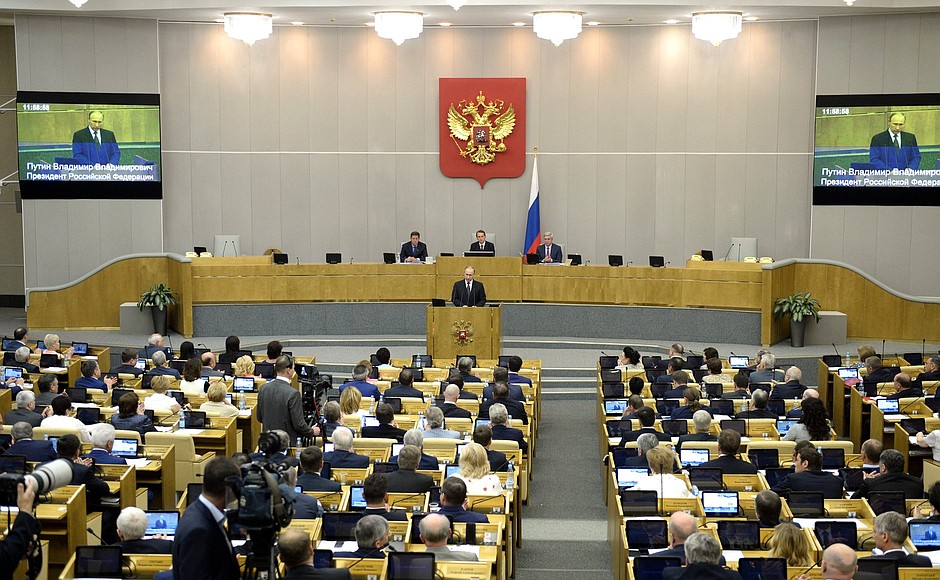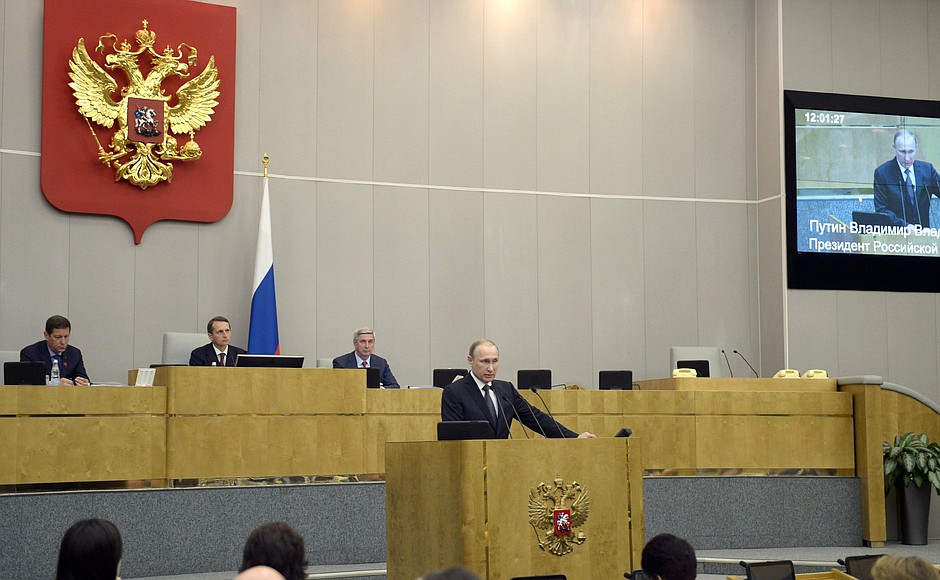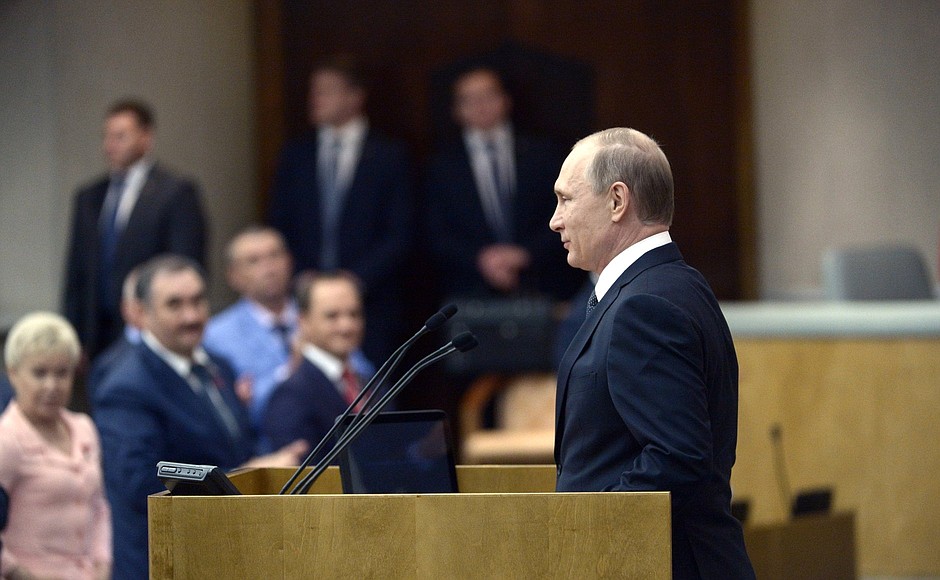President of Russia Vladimir Putin: Colleagues,
I wanted to meet with you as the parliament’s sixth convocation comes to the end of its mandate and thank you for your work over these years. I want to thank you and say a few words about the results of your work. Of course, I want to take a look forward too at the tasks the next parliament will have before it.
But first of all, let me turn to the tragic date we are marking today. Seventy-five years ago, Nazi Germany treacherously invaded the Soviet Union and the Great Patriotic War began. By this time, as we know, the Nazis has already enslaved many European countries.
The Soviet people took the brunt of the Nazis’ force, but they met the enemy with tremendous unity and resistance, and withstood the onslaught, fighting literally to the death to protect their homeland. They drove the enemy right back to its lair, inflicted a crushing defeat on the invaders and achieved the Great Victory.
Today, we bow our heads before this heroic generation. Our fathers and grandfathers gave their lives to save Russia and all of humanity from the fascist scourge. We will always remember their sacrifice and courage. We treasure the bright memory of all who gave their lives in that war, and all our veterans who are no longer with us now. I propose that we honour their memory with a minute of silence.
(Minute of silence)
It was the Nazis who unleashed this war. Their ideology of hatred, blind faith in their own exceptional nature and infallibility, and desire for world domination led to the twentieth century’s greatest tragedy.
We know the biggest lesson of that war: it could have been prevented. It could have been stopped if efforts had been made to firmly rein in the Nazis and their accomplices’ wild ambitions in time. But this did not happen. Our country, the Soviet Union, made direct proposals for joint action and collective defence, but these proposals were simply left hanging.
The leaders of a number of Western countries chose instead to pursue a policy of containing the Soviet Union and sought to keep it in a situation of international isolation. But it was Nazism that was the real and terrible global threat. Politicians underestimated its danger, overlooked the threat and did not want to admit that enlightened Europe could give birth to a criminal regime that was growing ever stronger.
Today, we bow our heads before this heroic generation. Our fathers and grandfathers gave their lives to save Russia and all of humanity from the fascist scourge. We will always remember their sacrifice and courage.
The international community let its vigilance down and lacked the will and unity to prevent this war and save the lives of millions and millions of people. What other lesson do we need today to throw aside tattered old ideological differences and geopolitical games and unite our forces to fight international terrorism?
This common threat is spreading its danger before our very eyes. We must create a modern collective security system beyond blocs and with all countries on an equal footing. Russia is open to discussions on this most important issue and has repeatedly stated its readiness for dialogue.
For now though, as was the case on the eve of World War II, we see no positive response. On the contrary, NATO is stepping up its aggressive rhetoric and aggressive actions close to our borders. In this situation, we have no choice but to devote particular attention to the tasks we must address in order to increase our country’s defence capability.
I would like to thank the State Duma deputies for their deep and substantive understanding of Russia’s state interests and for knowing how to defend these interests decisively. Of course, I also want to thank you for your consolidated legislative support for the proposals on strengthening our country’s security.
Colleagues, your work and its results deserve a worthy assessment. It is particularly important that the laws you have adopted have played a big part in enabling us to fulfil our social obligations to our citizens, develop our most important economic sectors and improve our country’s political system. I want to stress this point.
We must create a modern collective security system beyond blocs and with all countries on an equal footing. Russia is open to discussions on this most important issue.
You have accomplished a tremendous amount of work in all these areas. This successful work is the result of the efforts made by all parliamentary parties and their willingness to pursue a constructive dialogue with each other, with the Government, and with the other participants in the legislative initiative.
A truly historic result of this convocation’s work was the legal integration of Crimea and Sevastopol, which followed on your sincere and heartfelt moral support for the peninsula’s people on the eve of the referendum on joining the Russian Federation. You were active in supporting the view shared by the vast majority of Crimea and Sevastopol’s people, sometimes emotionally, and when needed, very professionally.
During this time, all parliamentary parties displayed a degree of unity of which your voters can be deservedly proud. In a very short period of time, you adopted more than 120 laws that smoothed the way for Crimea and Sevastopol’s entry into the Russian Federation. You helped people to get through the transition period’s difficulties, feel at home in Russia and know that their rights are reliably guaranteed and new opportunities have opened before them.
A readiness to consolidate for the sake of the tasks at hand and for Russia’s sake is this convocation’s distinguishing feature. It is very important now that the next parliamentary convocation continues these traditions, including this strict respect for the rules of parliamentary ethics. Continuity in law-making work is of tremendous importance.
This ensures the legislative base’s quality and also the authoritative reputation of the entire Russian jurisdiction. We should most definitely continue the practice of annual reports on the state of our country’s legislation. These reports are drafted by both chambers of the Federal Assembly together with the regional parliaments. This is a very useful practice, I think, very important work.
A truly historic result of this convocation’s work was the legal integration of Crimea and Sevastopol, which followed on your sincere and heartfelt moral support for the peninsula’s people on the eve of the referendum on joining the Russian Federation.
I want to stress particularly that the legislative branch is an independent branch of power and no opportunist, short term interests or desire to push some decision through as fast as possible should interfere with its work. There should be no hasty or superficial approach when examining and adopting laws. I particularly emphasise this point. The key task for the new convocation in the law-making process will be to ensure a well-planned and systemic legislative process with deep and substantive discussion of draft laws.
Colleagues, I particularly want to mention your great contribution to developing our political system. You have passed a whole swathe of laws that strengthen Russia’s democratic foundations, make the political system more transparent and effective, and set higher standards for political competition.
We now have ten times more political parties than we did five years ago. But we know very well that the political system’s quality cannot be measured by the number of parties, but by their ability to influence the decision-making process regarding the issues of greatest concern to our people.
The parliamentary parties have considerable advantages, and these opportunities are deservedly earned. But during the upcoming election campaign, you will have to pass the test once again before your voters. The executive order setting the date for the State Duma election has already been signed. The election will take place under the mixed-member system on September 18th.
Let me stress that the State Duma will soon get an influx of deputies elected in single-seat districts, and this will bolster considerably the parliament’s representative functions and ties with the regions. It is very important that your work gives our people added guarantees of their social rights. These rights should be guaranteed by laws that regulate education, healthcare, and the housing and utilities sector.
The legislative branch is an independent branch of power and no opportunist, short term interests or desire to push some decision through as fast as possible should interfere with its work. There should be no hasty or superficial approach when examining and adopting laws.
You have devoted much effort over these last years to precisely these issues, including support for motherhood and childhood. These are complicated issues of course, difficult problems, but their resolution is crucial for our country’s future. All of the different issues are important of course. Security and international affairs are important, but nothing is more important than the economy and the social sector.
We have put together an effective anti-corruption legal base over these last years, toughened requirements to all categories of civil servants, and introduced bans on opening accounts in foreign banks and possessing foreign companies’ assets.
Now we must ensure that all comply strictly with the law no matter what the office they hold. I am sure that we all share a unanimous position on this issue. I note too that the laws you have passed on strategic planning and industrial policy are extremely important, as is the law on priority development areas, for example.
The work on modernising civil law continues, including incentives for business and investment and measures to combat internet piracy. You have also passed the law on parliamentary oversight, which will most certainly raise the prestige and significance of the deputies’ work.
Improving our environmental legislation is an area of much importance today. Protecting nature and the animal and plant world and guaranteeing people’s right to a good natural environment are common tasks for all political parties. I know that during this parliament’s term you have examined draft laws on the preservation and restoration of forests and ensuring forest fire prevention. The new State Duma will have to continue this work just as actively as you have, all the more so as we have declared 2017 the Year of the Environment.
Now we must ensure that all comply strictly with the law no matter what the office they hold. I am sure that we all share a unanimous position on this issue.
All parliamentary parties have also shown unity on foreign policy issues. I already mentioned this. Yes, there were some attempts to play up differences between parties, but no one succeeded in splitting your unity and splitting the consolidation in our society and between your voters. At the same time, your contacts with colleagues abroad have become more intensive.
Friends, many political parties have already set dates for holding their congresses to announce candidates and present their campaign programmes. Essentially, the election campaign has begun. Ahead of you is some fierce competition, debates with opponents, and a far from easy time for all who will be taking part in these elections.
I hope that you will do everything possible to ensure that this election is honest, open, and takes place in a spirit of mutual respect. It is also my hope that you will hold a battle not of mudslinging against each other, but of ideas, the implementation of which should strengthen our country and raise our people’s living standards. I appeal to you to do this.
It is very important that all political parties realise their responsibility for preserving social stability and strive not just for the best election results, but for voters’ trust in the election’s outcome. I am sure that stability and trust are key factors and foundations for our country’s successful development.
You are all experienced people and have traversed all the difficulties of election campaigns before. But let me say again nonetheless that the most important players now are not the parties and candidates, but the voters, our country’s people. They are most important. It is they who give you the powers to decide their biggest problems so as to make our country an independent and effectively functioning state in which people can live and work in comfort and safety.
It is very important that all political parties realise their responsibility for preserving social stability and strive not just for the best election results, but for voters’ trust in the election’s outcome.
I am sure that you understand well the tasks before our country today. You have already demonstrated this through your work as deputies based on the principles of patriotism and service to people. You have succeeded in developing high standards of political and parliamentary culture and applying them in practice in your everyday work. It will be useful for our country and for the voters if this constructive political style becomes the distinguishing feature of this election campaign too.
You all have much work ahead of you. No matter where you will be working in the future, I wish you professional success and satisfaction, and I want to thank you once again for the very important and responsible work you have done in the Russian parliament.
Thank you very much.


